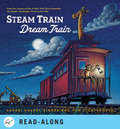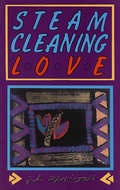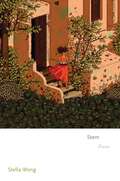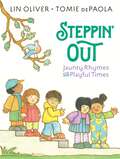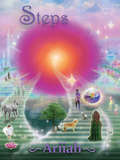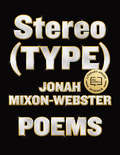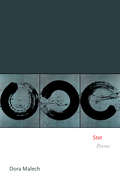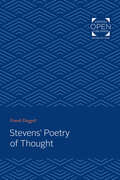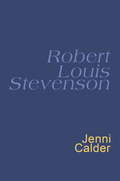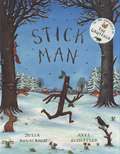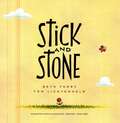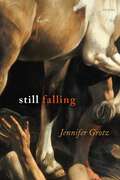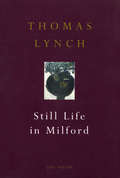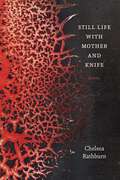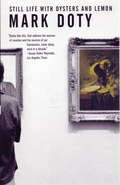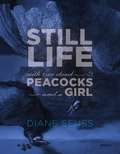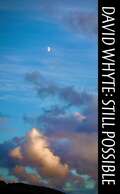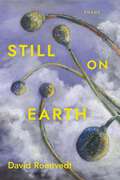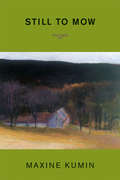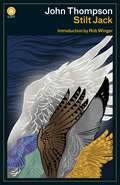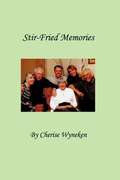- Table View
- List View
Steam Train, Dream Train (Goodnight, Goodnight, Construc)
by Sherri Duskey RinkerThe team behind the #1 New York Times bestseller Goodnight, Goodnight, Construction Site returns with another fabulous book for bedtime! The dream train pulls into the station, and one by one the train cars are loaded: polar bears pack the reefer car with ice cream, elephants fill the tanker cars with paints, tortoises stock the auto rack with race cars, bouncy kangaroos stuff the hopper car with balls. Sweet and silly dreams are guaranteed for any budding train enthusiasts! Plus, this is the fixed format version, which will look almost identical to the print version. Additionally for devices that support audio, this ebook includes a read-along setting.
Steam-Cleaning Love
by J. A. HamiltonJ.A. Hamilton distinguished herself with Body Rain (1991) a tough, passionate lyrical book written out of a woman's anger and a woman’s love. Steam-Cleaning Love, Hamilton’s second book of poetry, is "ginger root tough and jelly edgy" -- spicy, sweet, biting; it overwhelms, inundates, the palate. This new book revives the angry, biting, funny, loving, randy voice that won readers to her first volume, but sets that voice in a gentler space. These are passionate poems that celebrate women as friends and lovers, and the beauty, the delight, the desire of women's bodies.
Stem: Poems
by Stella WongA wide-ranging collection from a rising poet that showcases her sharp, contemporary voiceIn Stem, Stella Wong intersperses lyric poems on a variety of subjects with dramatic monologues that imagine the perspectives of specific female composers, musicians, and visual artists, including Johanna Beyer, Mira Calix, Clara Rockmore, Maryanne Amacher, and Delia Derbyshire. In such lines as &“let me tell you how I make myself appear / more likeable,&” &“as I grow older I like looking at chaos,&” and &“I want to propose a hike / and also propose mostly,&” Wong&’s style is confident and idiomatic, and by turns contemplative and carefree. Whether writing about family, intimate relationships, language, or women&’s experience, Wong creates a world alive with observation and provocation, capturing the essence and the problems of life with others.
Steppin' Out: Jaunty Rhymes for Playful Times
by Lin OliverCapturing the magic and fun of early childhood, this lively collection of poems, from the creators of Little Poems for Tiny Ears, is a book to be treasured. Being a preschooler means days full of discovery every time you step out of your door. It&’s a time filled with wonder, at all the sights and sounds of the outdoors and at the huge variety of people there are to meet. This collection of nineteen original poems features little ones eager to explore, whether it&’s splashing in puddles, riding in an elevator or through a car wash, or visiting the library. They go full-steam ahead to the park, the beach, and dance class, somewhat begrudgingly learn to share and get their first haircut, and enjoy lots of time with their families. Full of contagious rhythm and rhyme, this inviting picture book introduces young children to the sounds of poetry through familiar childhood activities, and beloved illustrator Tomie dePaola&’s engaging children are the perfect match for Lin Oliver&’s bouncy poems.
Stepping Out
by Robert FaganPoetry by the late author Robert Fagan, whose work has been likened to Borges and Joyce, and which has been influenced by art and music as well as by the best literary models.
Steps
by AriiahSTEPS by Ariiah is a poetic diary documenting how one Soul entered, by agreement, a body living on Earth. One took her leave and one took her welcome. When the host body lost its etheric particles and acquired new ones, a journey of Transformation began when the higher Soul was installed into the body. The author used poetry to cope with the tremendous Spiritual/physical/emotional and psychological challenges of the Process, while retaining the former host's memories. Poems became paper friends; hands to hold onto in the silence, giving comfort to the solitary passage. Everyone and everything grows Spiritually by taking Steps of Enlightenment. These poems were like handrails accompanying some of the steps. One of the steps was becoming a Group Soul. These steps were recorded without the thought of writing a book, but this little book, a Soul's personal journey into a new life in a different body and on Earth, became what it was meant to become. A poetic peek into an ascension at the Soul level. A completion of a promise written long ago, in Love. Enlightenment is not something that happens with one step. It is a process. A good metaphor is a staircase. Steps of Enlightenment open up everything and everyone. No two paths could ever be the same. But they do lead in the same direction. Everyone and everything goes back into the same Eternal Prime energy; a Love that cannot be described. I did an impossible thing. I changed staircases and became a totally different person. Wistancia took her leave and Ariiah took her welcome. My Soul was brought into this host body and placed on different Steps. It could never be easy to change Souls in the same body. This is the story of my journey. But it is more than that. We are all on a journey and we are all taking big steps now and they are going in the same direction. Today I am more gently slipping into my new garment of life. But even that is just another step.
Stereo(TYPE): Poems
by Jonah Mixon-WebsterA radical, urgent collection of poems about Blackness, the self, and the dismantling of corrupt powers in the fight for freedom. A PEN America Literary Award WinnerJonah Mixon-Webster works at the intersections of space and the body, race and region, sexuality and class. Stereo(TYPE), his debut collection of poetry, is a reckoning and a force, a revision of our most sacred mythologies, and a work of documentary reporting from Mixon-Webster&’s hometown of Flint, Michigan, where clean tap water remains an uncertainty and the aftermath of racist policies persist. Challenging stereotypes through scenes that scatter with satire, violence, and the extreme vagaries of everyday life, Mixon-Webster invents visual/sonic forms, conceptualizes poems as transcripts and frequently asked questions, and dives into dreamscapes and modern tragedies, deconstructing the very foundations America is built on. Interrogating language and the ways we wield it as both sword and shield, Stereo(TYPE) is a one-of-a-kind, rapturous collection of vital and beautiful poems.
Stesichorus in Context
by P. J. Finglass Finglass, P. J. and Kelly, Adrian Adrian KellyThe sixth-century BC Greek poet Stesichorus was highly esteemed in antiquity; but by about AD 400 his works had been almost completely lost. Over recent decades, however, the recovery of substantial portions of his poetry has enabled a reassessment of his significance. These essays by leading scholars analyse different aspects of his oeuvre: the relationship between Stesichorus and epic, particularly his response to the Homeric poems; his narrative technique and his handling of erotic themes; and his influence and reception in fifth-century Athens, in Hellenistic scholarship and poetry, in the Renaissance, and in poetry today. The volume as a whole - the first dedicated to this author - amply demonstrates the extraordinary creativity and continuing vitality of the poet from Himera.
Stet: Poems (Princeton Series Of Contemporary Poets Ser. #139)
by Dora MalechA fascinating collection of serious and playful poems that tap the inventive possibilities of the anagram and other constraining formsIn Stet, poet Dora Malech takes constraint as her catalyst and subject, exploring what it means to make or break a vow, to create art out of a life in flux, to reckon with the body’s bounds, and to arrive at a place where one might bear and care for another life. Tapping the inventive possibilities of constrained forms, particularly the revealing limitations of the anagram, Stet is a work of serious play that brings home the connections and intimacies of language.“Stet,” from the Latin for “let it stand,” is a proofreading term meaning to retain or return to a previous phrasing. The uncertainty of changes made and then reconsidered haunts Stet as its poems explore what is left unsaid through erasures, redaction, and the limitations of spelling. How does one “go back” on one’s word or “stand by” one’s decisions? Can a life be remade or revised, or is the past forever present as in a palimpsest? Embodying the physicality and reproductive potentiality inherent in the collection’s forms and figures, Stet ends expectantly, not searching for closure but awaiting the messy, living possibilities of what comes next.By turns troubling and consoling, Stet powerfully combines lyric invention and brilliant wordplay.
Stevens' Poetry of Thought
by Frank DoggettOriginally published in 1966. Stevens' Poetry of Thought is the first full-length study of Wallace Stevens as a thinker. With original insight, Mr. Doggett provides many detailed interpretations of individual poems in examining Steven's imagery. This is a pertinent treatment of Stevens' inherent affinity with the philosophic imagination of his time, showing how firmly this poet was linked through his images with the leading thinkers of the age just passed—especially Schopenhauer, Bergson, Santayana, Whitehead, William James, Jung, and Cassirer. The clear and perceptive reading of a great many of the poems in this book should illuminate the work of Stevens for all the readers who admire his language and wish for further insight into its significance. Beyond being a definitive exposition of Steven' poetry and a meaningful act of faith in the intellectual sophistication of Stevens, this is an exciting study of the human imagination which satisfies the need for distinction between poetry and philosophy while illuminating one by the other. Mr. Doggett demonstrates how the poetry of Stevens is a representative voice of the ideas of his age and illustrates Stevens own statement: "Poets and philosophers often think alike, as we shall see." Wallace Stevens is now recognized as one of the most important American poets of the twentieth century. His first volume of poems, Harmonium was published in 1923, and since then seven volumes of his work have appeared. He was awarded the Bollingen Prize in Poetry of the Yale University Library for 1949. In 1951 he won the National Book Award in Poetry for The Auroras of Autumn. The Collected Works of Wallace Stevens was awarded the Pulitzer Prize in Poetry in 1955. From 1916 to his death in 1955 he was associated with the Hartford Accident and Indemnity Company, of which he became vice-president in 1934.
Stevenson: Everyman's Poetry
by Robert Louis Stevenson Jenni CalderPoems for children, ballards for his friends in the South Seas, poetic tales of Scotland - a selection of the poetry Stevenson wrote all his life.
Stevenson: Everyman's Poetry
by Robert Louis Stevenson Jenni CalderPoems for children, ballards for his friends in the South Seas, poetic tales of Scotland - a selection of the poetry Stevenson wrote all his life.
Stick Man
by Julia DonaldsonSTICK MAN. Stick Man lives in the family tree, with his Stick Lady Love and their children three... But the world is a dangerous place for a Stick Man. A dog wants to play with him. A swan builds her nest with him. He even ends up on a fire! Will he ever get back to the family tree?
Stick and Stone (Stick And Stone Ser.)
by Beth FerryStick and Stone form a friendship till Stick is blown away in a storm and Stone goes to find him.
Still Falling: Poems
by Jennifer GrotzA searching new collection by a poet who “pays exquisite attention to everything she encounters” (The Washington Post)Still Falling expands on Jennifer Grotz’s precise sense of craft and voice to investigate new territory in this astonishing collection. These poems are emotionally raw and introspective, exploring the profound capaciousness of grief. Grotz carefully and deftly carries the weight of losses and their aftermaths—the deaths of the poet’s mentors, friends, and mother; the endings of relationships; and the enclosures of a life spent in attendance to the world in a state of wanting rather than truly living. Here also are poems that movingly and crucially decide what dedicating one’s life to poetry might require.But in the wake of painful loss, Grotz writes toward “this world, the living.” Her poems reveal and meditate on the paradoxical relationship between the literal and the figurative, at the heart of poetry itself, like the darkness and light of Caravaggio’s chiaroscuro. Still Falling is a book to be read slowly, calling readers back into the stillness of being, finding hope, “not death / where darkness and silence and dust are / only darkness and silence and dust.”
Still Life In Milford
by Thomas LynchIn Still Life in Milford, Lynch casts the cold eye we are told to on life and death, history and memory, the local and the larger geographics. Examining the dynamics of faith, remembrance, and intimate conduct, these poems are informed by end times, tribulations and visions that make up the ordinary enterprise of daily life. Colloquy and narrative, soliloquy and tribute, Still Life in Milford engages the full register of the poet's voices as elegist, eulogist, obituarist, straight man and passer-by to achieve a difficult and inimitable harmony.
Still Life with Mother and Knife: Poems
by Chelsea RathburnIn this powerful collection, Chelsea Rathburn seeks to voice matters once deemed unspeakable, from collisions between children and predators to the realities of postpartum depression. Still Life with Mother and Knife considers the female body, “mute and posable,” as object of both art and violence. Once an artist’s model, now a mother, Rathburn knows “how hard / it is to be held in the eyes of another.” Intimate and fearless, her poems move in interlocking sections between the pleasures and dangers of childhood, between masterpieces of art and magazine centerfolds, and—in a gripping sequence in dialogue with Delacroix’s paintings and sketches of Medea—between the twinned ferocities of maternal love and rage. With singular vision and potent poetic form, Rathburn crafts a complex portrait of girlhood and motherhood from which it is impossible to look away.
Still Life with Oysters and Lemon: On Objects and Intimacy
by Mark DotyMark Doty's prose has been hailed as "tempered and tough, sorrowing and serene" (The New York Times Book Review) and "achingly beautiful" (The Boston Globe). In Still Life with Oysters and Lemon he offers a stunning exploration of our attachment to ordinary things-how we invest objects with human store, and why.From the Trade Paperback edition.
Still Life with Two Dead Peacocks and a Girl: Poems
by Diane SeussFinalist for the National Book Critics Circle AwardFinalist for the Los Angeles Times Book PrizeDiane Seuss’s brilliant follow-up to Four-Legged Girl, a finalist for the Pulitzer Prize for PoetryStill life with stack of bills phone cord cig butt and freezer-burned DreamsicleStill life with Easter Bunny twenty caged minks and rusty meat grinderStill life with whiskey wooden leg two potpies and a dead parakeetStill life with pork rinds pickled peppers and the Book of RevelationStill life with feeding tube oxygen half-eaten raspberry ZingerStill life with convenience store pecking order shotgun blast to the face—from “American Still Lives”Still Life with Two Dead Peacocks and a Girl takes its title from Rembrandt’s painting, a dark emblem of femininity, violence, and the viewer’s own troubled gaze. In Diane Seuss’s new collection, the notion of the still life is shattered and Rembrandt’s painting is presented across the book in pieces—details that hide more than they reveal until they’re assembled into a whole. With invention and irreverence, these poems escape gilded frames and overturn traditional representations of gender, class, and luxury. Instead, Seuss invites in the alienated, the washed-up, the ugly, and the freakish—the overlooked many of us who might more often stand in a Walmart parking lot than before the canvases of Pollock, O’Keeffe, and Rothko. Rendered with precision and profound empathy, this extraordinary gallery of lives in shards shows us that “our memories are local, acute, and unrelenting.”
Still Possible
by David WhyteThe poems in Still Possible pay homage to the invisible passage of time - the deep, private current that wends through our lives as a steadfast companion, sculpting our interior worlds as inexorably and exquisitely as its visible manifestations. Whyte turns his eye, and his pen, to the possibilities and harvests this shaping reveals: the shyness and vulnerability of love, the illusion of imperfection, and the new invitations that beckon along the way. The poems reflect an abiding faith in time's wisdom: a journey turned away from in youth waits patiently for later maturity; an early experience ripens in secret to reveal, decades later, a full understanding. Under Whyte's poet-philosopher gaze, a rain-soaked day in an Irish farmhouse becomes a meditation on the essence of a truly good day: a settled contentment, alert and open to whatever may call. Plus, sheep, Seamus Heaney and a dog. Powerful language rests on a foundationof what isn't said, a silence underpinning the eloquence of articulation. In this way, Still Possible hovers above the numinous and the unknowable - what we pray for, what we pass on, what mystery awaits and, in the end, what it might mean to be happy.
Still on Earth: Poems
by David RomtvedtWith Still on Earth, David Romtvedt addresses the sometimes disconcerting, sometimes thrilling, and, if we accept the writer’s premise, always wacky crossings experienced by figures identified as the person, the poet, and the angel. All three intersect and collide with the society and culture within which they exist, prompting speculation that uncertainty could be preferable to knowing. Romtvedt’s delightfully plainspoken and immediate poems probe the mysterious purpose of our stay on earth with humor, candor, and grace. A poem, the father in the book argues, is worth next to nothing. And while the son disagrees, having experienced transformation through language, he also recognizes that the poem cannot buy the groceries and pay the rent. Or perhaps it can and it’s just tricky. After having devoted years to writing, the poet remains uncertain and speculates that uncertainty is not so bad and is preferable to knowing.Between the person and the poet, Still on Earth presents the angel who seems to have the same father that the person and the poet had. The two fathers are too close for comfort. For the angel, we must imagine a being with no experience of the physical suddenly confronted with the demands of the body, a being both naïve and worldly—otherworldly. The angel has been here before. In Romtvedt’s reckoning, we all have. It’s just hard to remember.
Still to Mow: Poems
by Maxine Kumin"Kumin writes ... with the clear gaze of a journalist and the ire of an activist.... Filled with love."--Christian Science Monitor Here Maxine Kumin's signature nature poems are shaken up and invigorated by the darker, human realities. Both "delicate and powerful" (Library Journal), she faces with equanimity the disappointments and joys of sixty years of marriage--ending with the unspoken question of "Which of us will go down first."
Stilt Jack (A List)
by John ThompsonThe much-loved, yet undervalued, final book of poems by British-Canadian poet John Thompson, is reissued in a handsome edition, featuring a new introduction by Rob Winger.Originally published in 1978, Stilt Jack is a series of powerful soliloquies on the complexity of love and the process of living. These are made immediate through Thompson’s command of metaphor, his eye for the New Brunswick landscape, his intense, often elliptical way of transfiguring everyday things into shorthand symbols of reality. This remarkable sequence of poems is based on the ghazal, an ancient Persian poetic form which is discussed in Thompson’s introduction to the original edition of the book.These poems more than fulfill the promise of Thompson’s first collection, At the Edge of the Chopping There Are No Secrets. Stilt Jack is the last testament of a major poet at the pinnacle of his craft.
Stir-fried Memories
by Cherise WynekenLike a Chinese menu, Stir-fried Memories serves tasty morsels that appeal to a variety of interests. It is a collection of essays and personal experience pieces combined much like vegetables are mixed together in a wok for a tasty stir-fried meal heaped with flavor, color, nutrition, and fragrance. It offers readers a taste of living through humor, travel, childhood, major moves, sickness, death, and family. Cherise Wyneken is a freelance writer and weekly columnist on poetry for the Oakland online version of the Examiner. Selections of her prose and poetry have appeared in over two hundred journals, periodicals, and anthologies, as well as two collections of poetry, two chapbooks, a memoir, a novel, and a children’s book.
